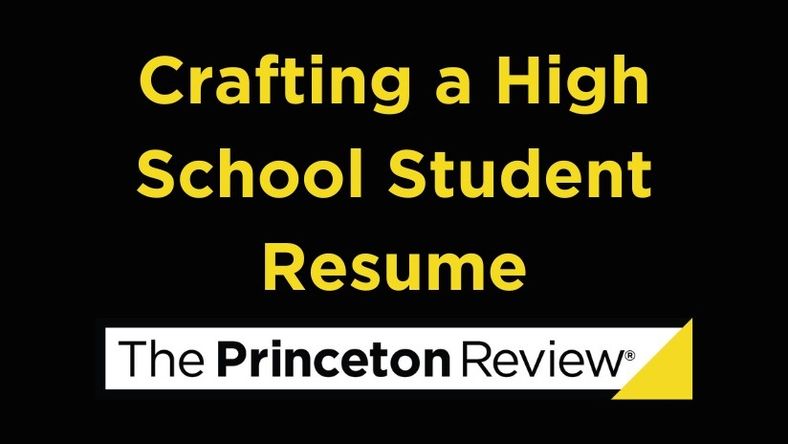
Think resumes are only for job seekers? Think again. A high school student resume gives colleges a snapshot of your accomplishments, extracurriculars, hobbies, and work history. They can also be a useful tool for prepping for a college interview or to give to the teachers who are writing your letters of recommendation .
Not sure how to get started? Follow our tips for crafting a standout resume for college and scholarship applications.
What should go on a high school student resume for college admissions?
Any of the sections below could appear on your resume for college applications. Pick an assortment that works for you!
- Heading with your name, address, and e-mail
- High school information with your graduation date, GPA (weighted), class rank, and SAT/ACT scores
- Academic awards, publications, honors, and other achievements
- Coursework (summer programs, college courses, or other specialized workshops that do not appear on your high school transcript)
- Extracurricular activities
- Community service
- Work experience
- Hobbies
- Special skills (e.g. foreign language fluency or HTML expertise)
When should you submit a resume to colleges?
Some colleges and scholarship committees request or recommend that you include a high school resume with your application materials. (But don’t submit a resume if they don’t ask for one—following instructions is a key application strategy.) Bring your resume to college interviews and give copies to your college counselor and teachers so that they can write you the strongest possible recommendation letter.

Tips for Composing Your College Admissions Resume
1. Keep it concise.
Pare down the activities you showcase to the most brag-worthy and most representative of you as a candidate. Do colleges need to know that you were on the field hockey team for one semester in Grade 9? Probably not. The standard rule of thumb is to stick to one or two pages.
2. Focus on depth and length of commitment.
When deciding which activities and accomplishments make the cut, keep in mind that colleges would much rather see you excited about one or two key experiences than sporadic involvement in 20 clubs. If having an after-school job limited your ability to participate in clubs or sports, make sure your resume plays up your work responsibilities, training, and on-the-job skills.
3. Provide detail whenever possible.
The details are what set a resume apart from a list of extracurriculars on a standard college application. For example, when describing your involvement in the French Club make sure to include:
- your role
- school years/hours per week you participated
- specific contributions (e.g. "Organized a successful after-school film series to introduce our community to French cinema and culture" )
- leadership roles (e.g. "Treasurer, Grade 12" )
- unique details that will make you stand out
4. Highlight things you weren’t able to write about in your college essays or short answers.
Use your high school resume to show colleges something new. If your devotion to photography didn’t make it on the application but is a big part of who you are, then showcase your photography cred on your resume.
5. Formatting is key.
Make your resume easy to scan. Divide information into sections with clear headings, bulleted lists, and a consistent font. Use a system of organization that works for you. (Chronological, by importance of activity, or by time commitment are a few options.) Don’t forget to proofread !
6. Be honest and accurate.
Colleges know how to spot inconsistencies in your high school student resume, and they won’t hesitate to call your counselor to verify information that doesn't seem right. So don't tell them that you have practice for the school play for 30 hours per week—unless drama club is somehow your full-time job!
Looking for strategic college advice?
Get one-on-one help from former Ivy League and top tier admission officers . Our College Counselors will help you find, apply, and get accepted to your dream school.
Read More
Explore Colleges For You
Connect with our featured colleges to find schools that both match your interests and are looking for students like you.
Get Started on Athletic Scholarships & Recruiting!
Join athletes who were discovered, recruited & often received scholarships after connecting with NCSA's 42,000 strong network of coaches.
Best 390 Colleges
168,000 students rate everything from their professors to their campus social scene.



